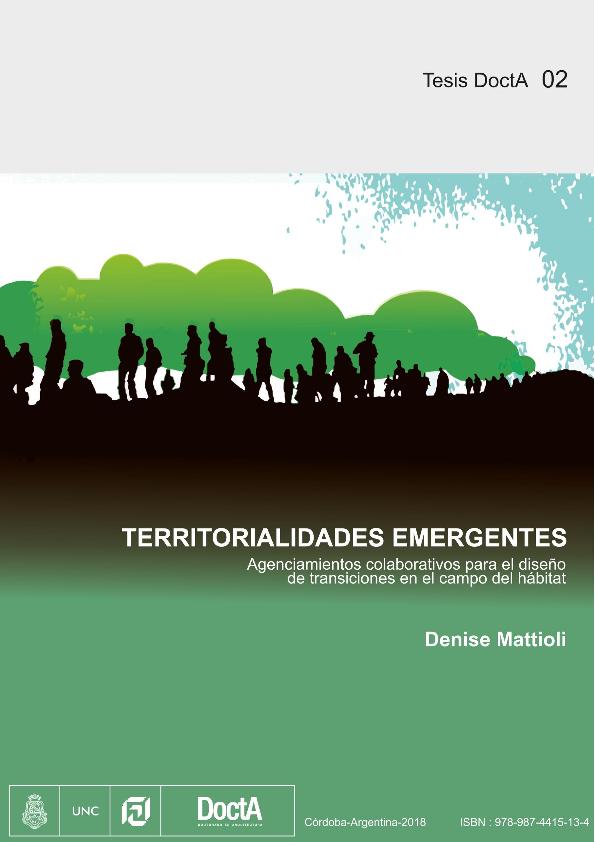Mostrar el registro sencillo del ítem
dc.contributor
Falu, Ana Maria

dc.contributor
Peyloubet, Paula

dc.contributor.author
Mattioli, Denise

dc.date.available
2019-12-16T17:19:53Z
dc.date.issued
2018-03-23
dc.identifier.citation
Mattioli, Denise; Falu, Ana Maria; Peyloubet, Paula; Territorialidades emergentes. Agenciamientos colaborativos para el diseño de transiciones en el campo del habitat; 23-3-2018
dc.identifier.uri
http://hdl.handle.net/11336/92279
dc.description.abstract
Esta investigación reflexiona sobre un conjunto de experiencias que vienen desarrollándose en la región serrana de Córdoba, relacionadas con la permacultura, la agroecología, proyectos de economías sociales y solidarias, redes culturales y asociaciones comunitarias en las que se reinventa el hacer colectivo. El interés por estudiar dichas formas de producción social del hábitat radica en su singular y distintiva apropiación social del territorio (Leff, 2001), en sintonía con el cuidado de la tierra (ontología territorial) y los pares (ontología relacional). En ellas encontramos, además, una serie de atributos que deconstruyen las formas de producción convencional y se podrían relacionar con el concepto -cada vez más expandido- de transiciones, considerando que el planteo principal que promueven las teorías e iniciativas de transición es el de ofrecer alternativas al proceso global del deterioro ecológico y social que predomina en gran parte del planeta (Toledo, 2014) a raíz de la persistente implementación de formas de desarrollo destructivas de la naturaleza (Federici, 2018). Es de interés en este estudio, por lo tanto, descubrir la manera en que distintos grupos sociales reinventan prácticas comunitarias y cooperativas, a partir de la problematización del núcleo cultura-naturaleza, desde un enfoque crítico del sistema dominante. El desafío que asume esta investigación entonces, es el de aportar referencias para transitar procesos de transición hacia formas más sostenibles de estar y hacer en el mundo, de habitar la tierra.
dc.description.abstract
Gathering with neighbors, friends and/or relatives to build dwelings, cultural and recreational facilities in solidarity? Use the available resources of the territory as raw materials? Recovering, recycling, reusing disused items or simple technologies? Creating diverse networks to promote new forms of association and work for production, consumption and exchange? These questions frequently arise among those who do not know that, in highland villages in the province of Córdoba, people are getting together to unify their efforts for purposes as diverse as stopping a fumigation, or putting out a fire, resolving access to habitat issues, or preventing extractivist projects -that risk health, natural resources (commons), and habitability conditions of territories-from setting up. With the intention of studying a small fragment of the Paravachasca valley it is considered an assumption and a reason for reflection on this ongoing research project that these initiatives emerge in counterhegemonic and emancipatory keys to the global process of ecological and social deterioration in this phase of capitalism (Toledo, 2014),and therefore offer answers to the problems of the habitat where they inscribe their practices.The inscription of the problem that motivates them, it is found in the separation that modern culture has created in nature. Diverse lines of thought and movements ─ecology and political economy, post-extractivism, post-development, eco-feminisms, community feminisms, good living (sumac kawsay), degrowth, epistemologies of the south, decolonial and postcolonial perspective, among others─interpret that the dualistic conception of modern rationality and the capitalist system ─as an determination of the way of seeing, acting and transforming the world─has generated an epistemic breakdown as considering the territory as a mere support, a substantial resource for development and not as a living being thatis part of a whole. This construction of reality, mediated by the discourse of development, was forging the imaginary of a world that functions as a machine. Thus, the recurring processes of deterritorialization and devitalization of the territories manifest the unsustainability. That reason has led to these currents of thought to problematize the relationship of culture-nature nucleus.With regard to this conjuncture, the habitat understood as the support where the plots and articulations of everyday lifeare inscribed, in an ever-evolving cultural and experiential space-time, allows us to recognize a multiplicity of expressions that not only challenge the dominant model, but also reconcile nature-culture nucleus, from the perspective that the crisis processes can only be faced by creating new or others forms of existences that overcome that duality. Initiatives undertaken from diverse collective agencies (temporary or permanent), interwoven local-based networksthat would account for emerging territorialities, which create mutually enriching ways of interaction between people and between people and their vital environment. Their subjectivities and epistemes are fundamental to appeal to a transdisciplinary and integral work in the habitat field.These practices surveyed expresses renewed forms of access, participation, and habitat transformations, redefining the concepts terms of progress or well-being. They are all forms of everyday design in which local actions create new functions, practices and meanings to it. These processes show us a way of transitions to find a more solidary way of living. Micro-politically organized collaborative projects that promote transitions, as a condition of possibility to re-articulate proximity in new forms of coexistence.The idea of transitions is then presented as a horizon for the production of the common in the habitat field; the opportunity to build a common platform to recover, strengthen and encourage territorialities characterized by true sustainability, pluralityand resilience to the processes of change. The challenge that this research assumes is to provide references go throughthose transition processes towards more sustainable forms of being and doing in the world, of inhabiting the land.
dc.format
application/pdf
dc.language.iso
spa
dc.rights
info:eu-repo/semantics/openAccess
dc.rights.uri
https://creativecommons.org/licenses/by-nc-sa/2.5/ar/
dc.subject
TERRITORIOS RUR URBANOS
dc.subject
CONFLICTOS SOCIO AMBIENTALES
dc.subject
PRACTICAS HABITACIONALES ALTERNATIVAS
dc.subject
TRANSICIONES CIVILIZATORIAS
dc.subject.classification
Otras Humanidades

dc.subject.classification
Otras Humanidades

dc.subject.classification
HUMANIDADES

dc.title
Territorialidades emergentes. Agenciamientos colaborativos para el diseño de transiciones en el campo del habitat
dc.type
info:eu-repo/semantics/doctoralThesis
dc.type
info:eu-repo/semantics/publishedVersion
dc.type
info:ar-repo/semantics/tesis doctoral
dc.date.updated
2019-10-28T19:52:49Z
dc.description.fil
Fil: Mattioli, Denise. Universidad Nacional de Córdoba. Facultad de Arquitectura, Urbanismo y Diseño. Instituto de Investigación de la Vivienda; Argentina. Consejo Nacional de Investigaciones Científicas y Técnicas. Centro Científico Tecnológico Conicet - Córdoba; Argentina
dc.relation.alternativeid
info:eu-repo/semantics/altIdentifier/url/https://rdu.unc.edu.ar/handle/11086/6048
dc.conicet.grado
Universitario de posgrado/doctorado

dc.conicet.titulo
Doctora en Arquitectura
dc.conicet.rol
Autor

dc.conicet.rol
Director

dc.conicet.rol
Codirector

dc.conicet.otorgante
Universidad Nacional de Córdoba. Facultad de Arquitectura, Urbanismo y Diseño

Archivos asociados
